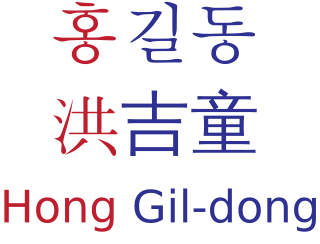Related Research Articles

Korean names are names that place their origin in, or are used in, Korea. A Korean name in the modern era typically consists of a surname followed by a given name, with no middle names. A number of Korean terms for names exist. For full names, seongmyeong, seongham, or ireum (이름) are commonly used. When a Korean name is written in Hangul, there is no space between the surname and the given name.
Seok, also spelled Suk, is a rare Korean family name held by about 56,500 South Koreans, as well as an element in some Korean given names.
Kyung, also spelled Kyoung, Gyeong, Kyeong, or Kyong, is an uncommon Korean family name, as well as a single-syllable Korean given name and an element in many two-syllable Korean given names.
Seong (Korean: 성), also spelled Song or Sung, is an uncommon Korean family name, a single-syllable Korean given name, as well as a common element in two-syllable Korean given names. The meaning differs based on the hanja used to write it.
Moon, also spelled Mun, is a Korean family name, a single-syllable Korean given name, and an element in some two-syllable Korean given names. Its meaning differs based on the Hanja used to write it.
Ju, also spelled Joo or Chu, is a Korean family name and an element in Korean given names. Its meaning differs based on the hanja used to write it.
Myung-sook, also spelled Myeong-sook or Myong-suk, is a Korean feminine given name. Its meaning differs based on the hanja used to write each syllable of the name. There are 19 hanja with the reading "myung" and 13 hanja with the reading "sook" on the South Korean government's official list of hanja which may be registered for use in given names. Myung-sook was the fifth-most popular name for newborn girls in South Korea in 1950.
Myung-hee, also spelled Myong-hui, Myeong-hui, or Myeong-hee, is a Korean unisex given name. Its meaning differs based on the hanja used to write each syllable of the name.
Hyun, also spelled Hyeon or Hyon, Hyoun, is a Korean surname, a single-syllable Korean given name, and an element in many two-syllable Korean given names. As given name meaning differs based on the hanja used to write it. There are 45 hanja with the reading "hyun" on the South Korean government's official list of hanja which may be used in given names.
So, also spelled Soh, is a Korean family name and an element in Korean given names. Its meaning depends on the hanja used to write it.
Chul, also spelled Cheol or Chol, is a single-syllable Korean masculine given name, as well as an element in some two-syllable Korean given names. Its meaning differs based on the hanja used to write it.
Ji, also spelled Jee, Chi, or Chee, is a Korean family name, as well as a popular element in Korean given names. The meaning differs based on the hanja used to write it.
Jeong, also spelled Jung or Jong, Chung, Chong is a single-syllable Korean given name, and an element in many two-syllable Korean given names. Its meaning differs based on the hanja used to write it. There are 84 hanja with the reading "Jeong" on the South Korean government's official list of hanja which may be used in given names.
Sook, also spelled Suk, is a single-syllable Korean given name, as well as an element in many two-syllable Korean given names. Its meaning differs based on the hanja used to write it.
In is an uncommon Korean family name and an element in Korean given names. Its meaning differs based on the hanja used to write it.
Ok, sometimes spelled Oak or Ock, is an uncommon Korean family name, a single-syllable Korean given name, and an element in some two-syllable Korean given names. It is usually written with a hanja meaning "jade".
Myung-ok, also spelled Myong-ok, is a Korean feminine given name. Its meaning differs based on the hanja used to write each syllable of the name. There are 19 hanja with the reading "myung" and five hanja with the reading "ok" on the South Korean government's official list of hanja which may be registered for use in given names.
Myung-hwa, also spelled Myong-hwa in North Korea, is a Korean feminine given name. Its meaning differs based on the hanja used to write each syllable of the name.
Myung-jun, also spelled Myeong-jun or Myŏng-jun, is a Korean masculine given name. Its meaning differs based on the hanja used to write each syllable of the name. There are 19 hanja with the reading "myung" and 34 hanja with the reading "jun" on the South Korean government's official list of hanja which may be registered for use in given names. People with this name include:
Eun (Korean: 은), also spelled Un, or En, Ehn, Enn, Unn, is a single-syllable Korean given name and an element in many two-syllable Korean given names.
References
- ↑ "한국성씨일람" [List of Korean family names]. Kyungpook National University. 2003-12-11. Retrieved 2013-10-30.
- ↑ "성씨인구분포데이터" [Family name population and distribution data]. South Korea: National Statistics Office. Archived from the original on 2013-11-01. Retrieved 2013-05-28.
- ↑ 성씨 로마자 표기 방안: 마련을 위한 토론회 [Plan for romanisation of surnames: a preparatory discussion]. National Institute of the Korean Language. 25 June 2009. p. 58. Retrieved 22 October 2015.
- ↑ "인명용 한자표" [Table of hanja for use in personal names](PDF). South Korea: Supreme Court. Retrieved 2013-10-17.
- ↑ "한국인이 가장 줗아하는 이름은 무엇일까?". babyname.co.kr. Retrieved 2012-11-09.